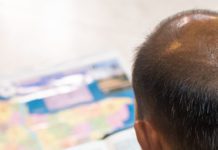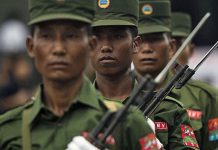By BosNewsLife Asia Service

TRANG BANG, VIETNAM (BosNewsLife)– The girl-turned-woman who helped end the Vietnam War when she was pictured screaming naked as blobs of sticky napalm melted through her clothes, says she has embraced Christianity as a way to forgive and find healing in love.
Friday, June 8, marks the 40th anniversary of the Pulitzer Prize winning Associated Press (AP) photo with 9-year-old Kim Phuc and other children running down Route 1 near her Vietnamese village of Trang Bang, after an areal napalm attack in a battle between north and south Vietnamese forces.
On that fateful day of June 8, 1972, the girl’s clothes literally melted on her body as everything around her was consumed by fire when a South Vietnamese plane dropped its flaming napalm on civilians while searching for Communist North Vietnamese forces and their Viet Cong allies.
As she and her older brother joined others running from the destruction, young AP photographer, Huynh Cong “Nick” Ut snapped the picture that friends and foes say helped to finish the Vietnam War.
“Too hot! Too hot!”, she was heard screaming at the time, as clothes and layers of skin disappeared like jellied lava.
ICONIC IMAGE
It took about a second for AP photographer Ut to snap the iconic black-and-white image 40 years ago, but it communicated the horrors of the Vietnam War in a way words could perhaps never describe.
He then ran to help Kim Phuc, who miraculously survived the third-degree burns over much of her body.
“Napalm is the most terrible pain you can imagine,” Phuc said in a Faith Today publication article, republished Friday, June 8, by the Breaking Christian News (BCN) service.
“Water boils at 100 degrees Celsius. Napalm generates temperatures of 800 to 1,200 degrees Celsius.”
The photo was famous, but her name remained largely unknown except to those living in her tiny village near the Cambodian border. For others she was just “the girl in the picture” or the ‘Napalm Girl’, one of many nameless victims of a conflict that became one of the most controversial chapters in America’s history.
MANY SURGERIES
And, after 17 surgeries, Phuc returned home, or what was left of it, and just wanted to be “a normal kid again.”
AP’s Ut and a few other journalists sometimes visited her, but that stopped after northern Communist forces seized control of South Vietnam on April 30, 1975, ending the war.
She planned to become a doctor, but the Vietnamese government realizing she had propaganda value wanted to use her as their “National Symbol of War”.
The teenager was made to leave school and participate in highly choreographed publicity gatherings, including meeting journalists in her village.
Phuc, now 49, recalled the darkness and bitterness that surrounded her in those days saying “I didn’t want to live anymore.”
BIBLE DISCOVERED
Though Phuc wasn’t allowed to attend school anymore, she was still a seeker of truth and became engrossed in books at the library. It was there that she stumbled upon a Bible, and “I couldn’t stop reading it,” she told in Friday’s republished interview.
Eventually she attended a church. “I heard the Gospel explained to me for the first time. The love of God changed my life. I knew that Jesus died on the cross and paid for my sins. So I asked God, ‘Do You forgive me?'”
Still struggling with anger and sorrow over her life, which she described as a cup of bitter, dark coffee, Phuc said she asked the Lord, “How can I clean everything
in my heart if it’s full of coffee?” She found that the answer was in pouring out that cup each day “until it became empty and God spilled His love into my cup.”
After being allowed to study in Cuba for a time, she met and married fellow Vietnamese student Bui Huy Toan, and after honeymooning in Moscow, the couple grabbed their chance at freedom.
As their plane stopped for fuel in Newfoundland, the two defected and began a new life together in Ontario, Canada.
FORGIVENESS OFFERED
In 1996, Phuc spoke at the Veteran’s Day ceremonies in Washington, DC, expressing forgiveness for the soldiers, BCN recalled.
While there, she met one of the pilots who had bombed her village. After assuring him of her forgiveness, he reportedly told her: “This is the happiest day of my life.”
Named a ‘Goodwill Ambassador for Peace’ by the United Nations Educational, Scientific and Cultural Organization (UNESCO) in 1997, Phuc said, “I am not involved in politics or religion. I just let them know it’s about the love of God and the love of people. That is more powerful than any weapon of war.”
She once summarized her experiences in a poem, writing: “Had it not been for the war, I would not value peace. Had it not been for pain, I would not know the healing power of love. Had it not been for hatred, I would never have learned to forgive. Had it not been for imprisonment, I would not value freedom. Had it not been for living in want, I would not value everything I have. Had it not been for fear, I would not value peace…”
(With BosNewsLife’s Stefan J. Bos and reporting by Margie Mason of the Associated Press, Aimee Herd of Breaking Christian News, and Emily Wierenga of Faith Today).
Read more about Kim Phuc’s faith here.









what an incredible story. The Love of Christ is Power unequaled.